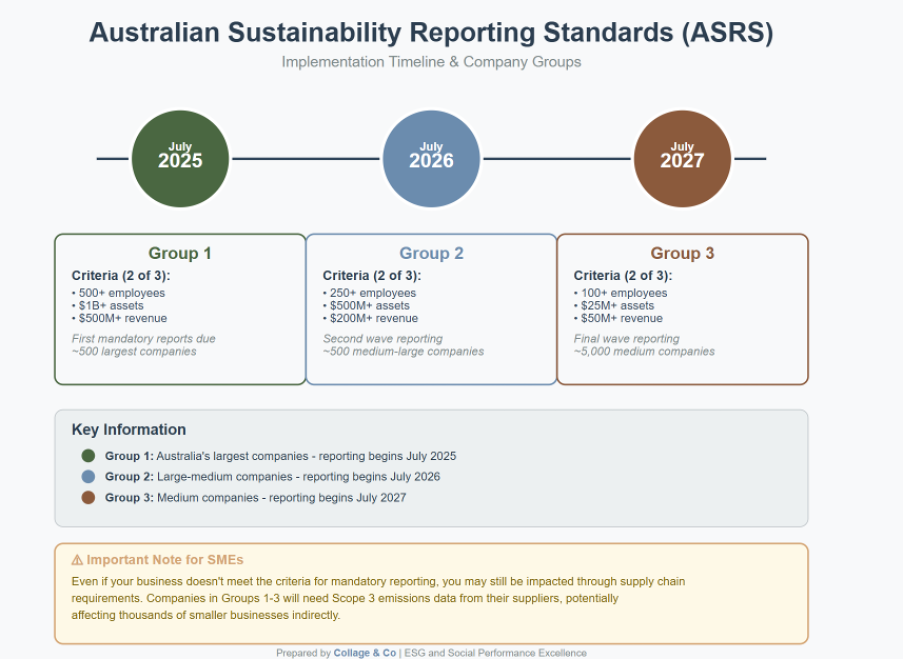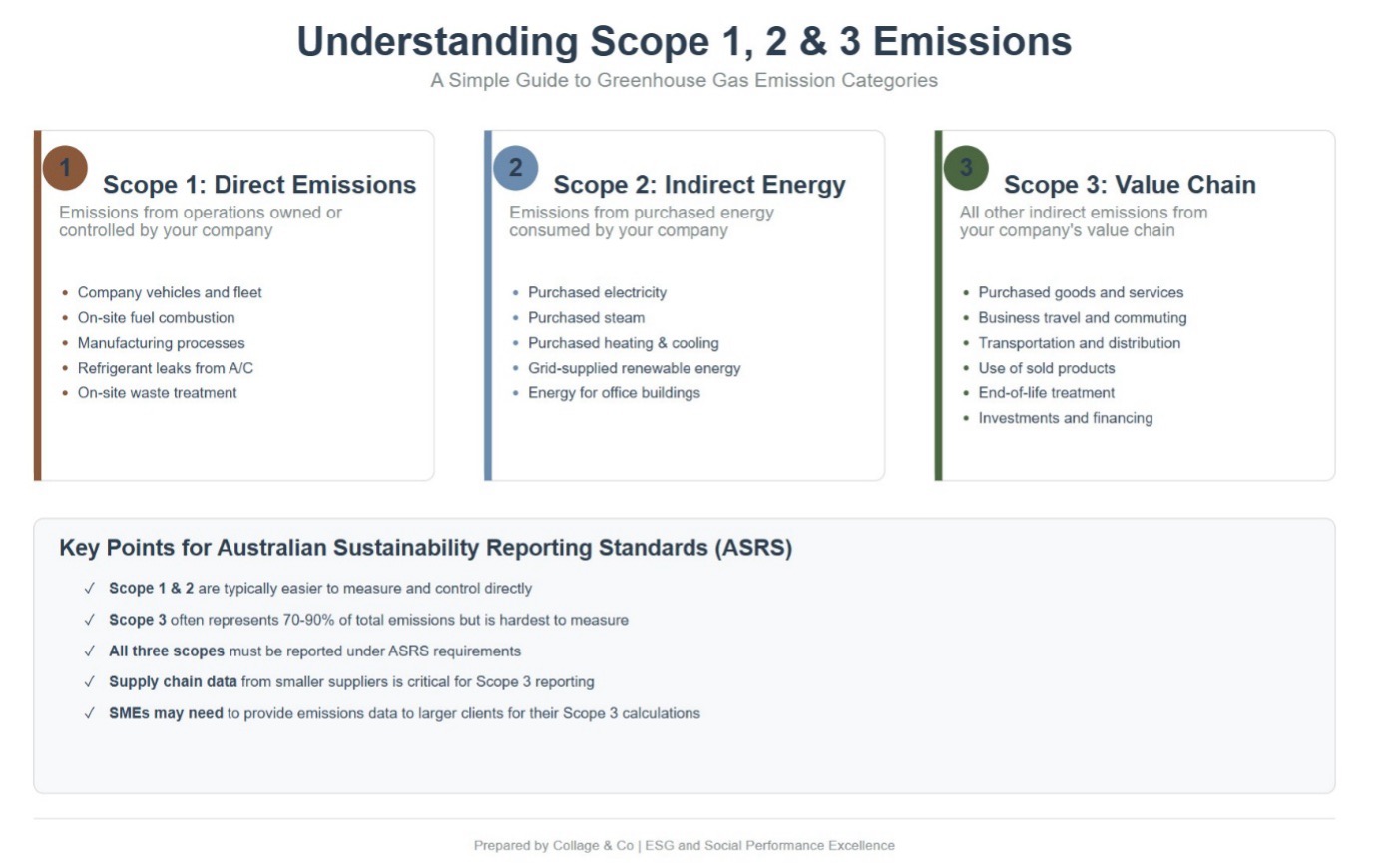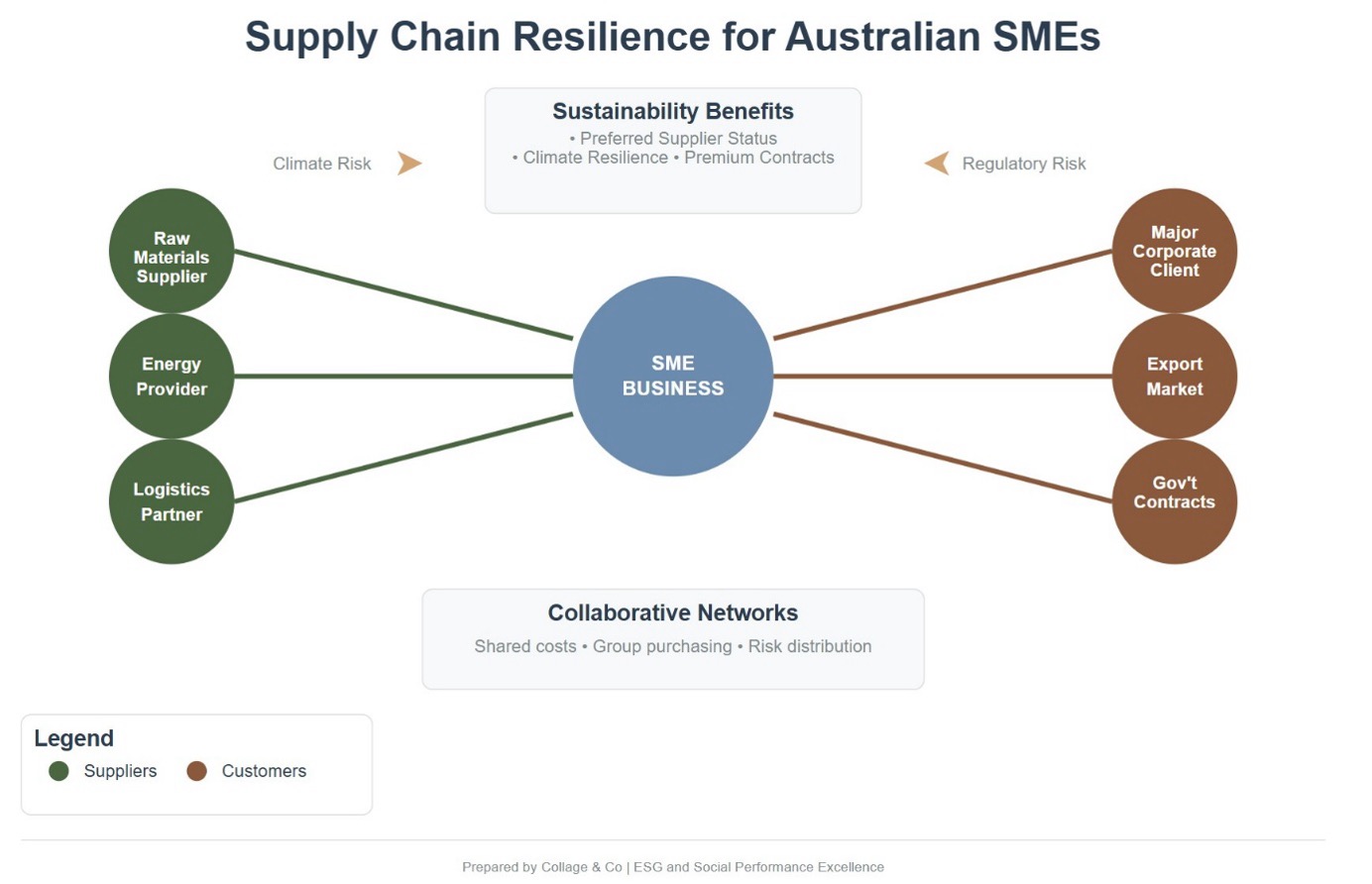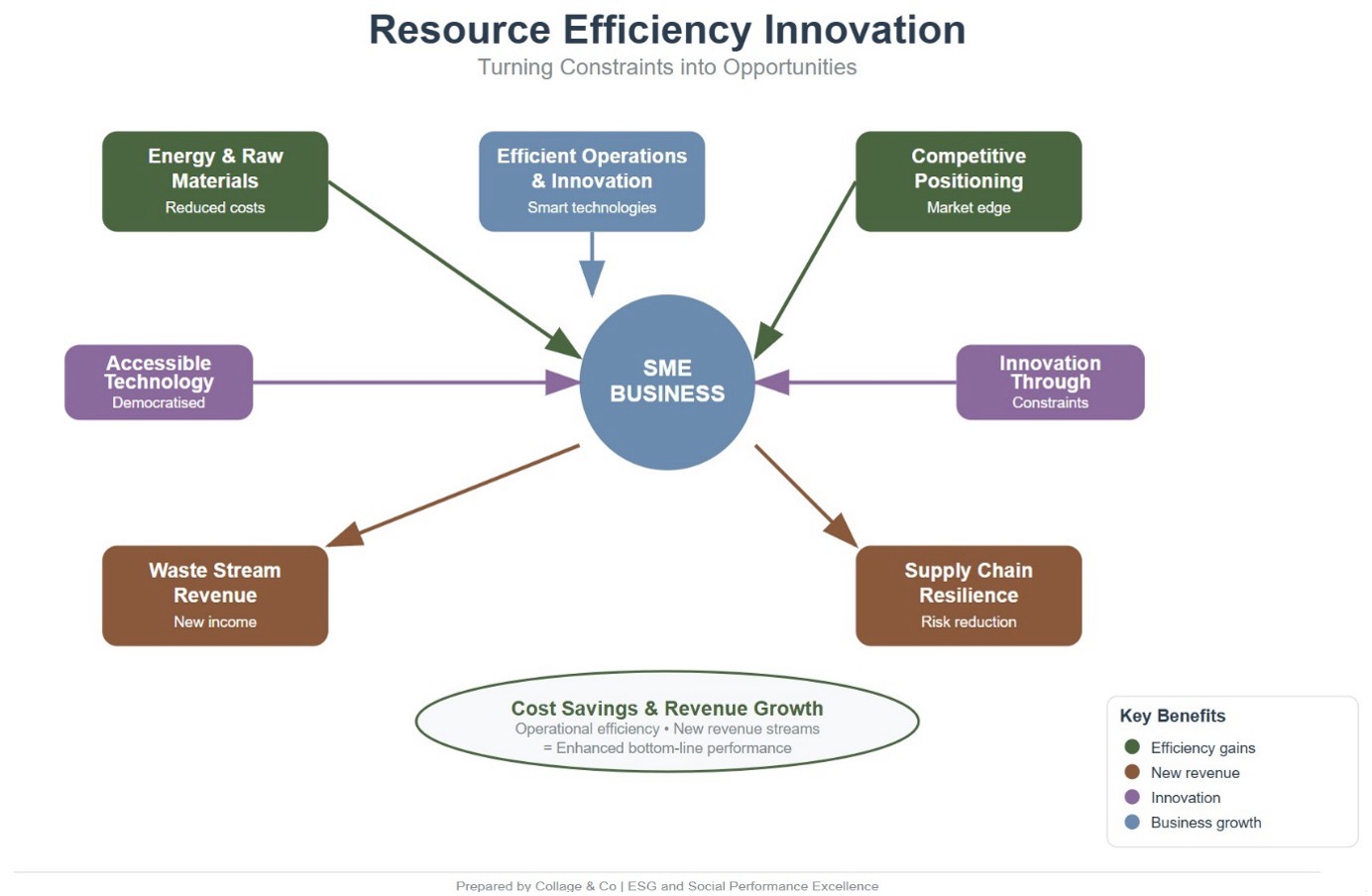Australia’s small and medium enterprises (SMEs) are discovering that effective Environmental, Social, and Governance (ESG) and sustainability risk management has evolved from a compliance obligation to a strategic advantage as we approach mid-2025.
As global supply chains increasingly scrutinise environmental and social performance, Australian SMEs embracing comprehensive sustainability practices are gaining competitive differentiation while building resilience against emerging market pressures.
There are four key areas that Australian SME’s can build value and potentially market leadership for their business:
- Getting ahead of the new Australian Sustainability Reporting Standards (ASRS)
- Building overall supply chain resilience
- Resource efficiency and innovation
- Talent attraction and retention
Australian Sustainability Reporting Standards (ASRS) – Getting ahead of the new requirements
Australia’s sustainability reporting landscape is undergoing rapid transformation, and businesses that prepare now will reap significant rewards, while their competitors scramble to catch up.
Starting January 2025, Australia began implementing the Australian Sustainability Reporting Standards (ASRS).
This regulatory shift isn’t just another compliance exercise – it’s catalysing a fundamental transformation in how Australian businesses approach sustainability, creating unprecedented opportunities for SMEs to differentiate themselves in competitive markets.

The Ripple Effect: Why every SME will be impacted
Even if your organisation doesn’t fall into the initial ASRS reporting groups (and it is likely that it doesn’t), the ripple effects will impact an estimated 6,000+ businesses across Australia directly, with thousands more SMEs indirectly affected through supply chain relationships.
Group 1-3 entities with Scope 3 emissions reporting requirements are now requesting detailed climate data from their suppliers, creating both challenges and opportunities for smaller businesses.

You may need to be prepared to provide:
Scope 3 emissions reporting requirements with detailed climate data when you have never engaged with formal climate reporting before.
This means businesses across the supply chain must prepare to provide:
- Greenhouse gas emissions data across operations
- Climate risk assessments and mitigation strategies
- Evidence of governance frameworks managing climate-related risks
- Transition plans outlining pathways to net-zero emissions
Australian businesses with robust traceability systems and verified sustainability credentials are securing preferred supplier status with larger entities, thereby gaining access to premium contracts while mitigating disruption risks associated with environmental events and regulatory changes.
Supply Chain Resilience: Your gateway to premium partnerships
Supply chain resilience has emerged as the most significant competitive advantage for sustainability-prepared SMEs.
Australian businesses across mining, construction, and import/export sectors are experiencing unprecedented supply chain vulnerability, from extreme weather events disrupting operations to regulatory changes affecting international trade. SMEs that have invested in comprehensive sustainability practices are not just surviving these challenges; they’re thriving.
Companies implementing robust sustainability frameworks throughout their supply chains are experiencing:
- Reduced disruption risks from climate-related events
- Enhanced supplier relationships through collaborative sustainability initiatives
- Improved cost management through efficiency improvements and waste reduction
- Regulatory compliance with emerging supply chain due diligence requirements
- Access to premium contracts with sustainability-conscious larger partners.

Resource Efficiency Innovation: Turning Constraints into Opportunities
Energy and material optimisation has delivered substantial cost advantages for sustainability-focused SMEs, particularly valuable during ongoing resource price volatility.
Progressive businesses have implemented circularity principles that transform waste streams into revenue opportunities while reducing procurement expenses.
The proliferation of accessible efficiency technologies specifically designed for smaller operations has democratised sustainability improvements previously available only to larger corporations.
Real-world benefits SMEs are capturing include:
- Operational cost reductions through energy efficiency and waste minimisation
- New revenue streams from circular economy initiatives
- Enhanced resource security through diversified supplier networks
- Improved operational resilience against resource price volatility
- Innovation opportunities from constraint-driven creativity
SMEs are achieving meaningful operational savings while enhancing their environmental performance, proving that sustainability investments deliver tangible bottom-line benefits even for resource-constrained businesses.

Talent Attraction and Retention: The Hidden Competitive Advantage
Most significantly, SMEs with authentic sustainability commitments are outperforming competitors in securing and retaining skilled talent in Australia’s tight labour market.
Purpose-driven organisations with demonstrated ESG credentials are particularly appealing to younger workers seeking alignment between personal values and employment choices.
These businesses are experiencing higher productivity, reduced recruitment costs, and enhanced innovation from diverse workforces united around meaningful sustainability objectives.
The talent advantage manifests in:
- Higher employee engagement and job satisfaction scores
- Reduced recruitment costs and shorter time-to-hire
- Lower staff turnover and improved retention rates
- Enhanced innovation capacity from values-aligned teams
- Stronger employer branding in competitive talent markets
So, what should you be doing and where should you start?
For most SMEs, the key advice is to put this on your radar and consider the capabilities and resources required to manage this.
For example, when it comes to the Australian Sustainability Reporting Standards (ASRS), getting ahead of the new requirements involves considering four key areas.
- Data Management Systems for Emissions Tracking: Many businesses lack robust systems to collect, verify, and report emissions data across their operations. Without a proper data infrastructure, accurate reporting becomes impossible
- Climate Risk Assessment and Scenario Modelling: Few organisations have implemented comprehensive processes to identify, assess, and quantify climate-related risks to their business model, operations, and financial performance.
- Governance Frameworks and Board-Level Oversight: Many boards and management teams lack the climate literacy and governance structures necessary to provide effective oversight of climate-related risks and opportunities.
- Setting Appropriate Materiality Thresholds: Determining which climate-related issues are material to business operations and stakeholders remains a complex challenge for many organisations.
Creating a Competitive Advantage
Forward-thinking businesses are already recognising climate reporting as a strategic opportunity rather than just a compliance burden.
Proactive preparation for ASRS requirements enables your business to unlock multiple competitive advantages:
Secure Preferred Supplier Status
Large entities required to report under ASRS are prioritising suppliers who can provide verified sustainability data. Being prepared positions your business as a preferred partner, opening access to premium contracts and long-term relationships.
Enhance Stakeholder Confidence
Transparent climate disclosures build trust with customers, investors, employees, and regulators. In an increasingly sustainability-conscious market, this transparency becomes a powerful differentiator.
Access Emerging Green Finance Options
Financial institutions and investors are increasingly favouring businesses with strong sustainability profiles. ASRS-ready businesses can access green bonds, sustainability-linked loans, and ESG-focused investment funds more easily.
Identify Efficiency Opportunities
The process of measuring and managing climate impacts often reveals operational inefficiencies. Many businesses discover cost-saving opportunities in energy use, waste reduction, and resource optimisation.
The Bottom Line for Australian SMEs
The sustainability transformation represents a business opportunity for Australian SMEs. Those that recognise sustainability as a strategic advantage rather than just a compliance burden will emerge stronger, more resilient, and better positioned for sustainable growth.
The evidence is clear
SMEs with comprehensive sustainability practices are already outperforming competitors across multiple metrics, from supply chain partnerships to talent retention to operational efficiency.
Don’t wait for larger competitors to set the agenda. Start building your sustainability advantage now and position your SME as a leader in Australia’s evolving business landscape.
Your Complimentary 30-minute ESG Consulting Offer
Collage & Co is offering the Ledge Finance community 30 minutes of complimentary consulting time to help you with sustainability success in 2025.
Email info@collageandco.com.au to book your session now.
Research consistently shows growing customer willingness to pay premiums for sustainable options, particularly among younger demographics.
Absolutely. SMEs often have advantages in agility, authentic purpose, and direct stakeholder relationships that larger companies struggle to match.
Many sustainability improvements pay for themselves through efficiency gains, and there are increasingly accessible technologies and support programs designed for smaller businesses.
Getting a good external partner to guide you through the complexity and the rapidly changing environment.
About Collage & Co
Collage & Co is a strategic ESG consultancy that helps organisations integrate environmental, social, and governance principles into their core operations through comprehensive frameworks, stakeholder engagement, and purpose-driven transformation strategies.
This information is provided by Erin Bourne at Collage & Co. Erin Bourne (MBA, GAICD) is a strategic ESG and sustainability leader with extensive experience across energy, resources, media, finance, and not-for-profit sectors.





